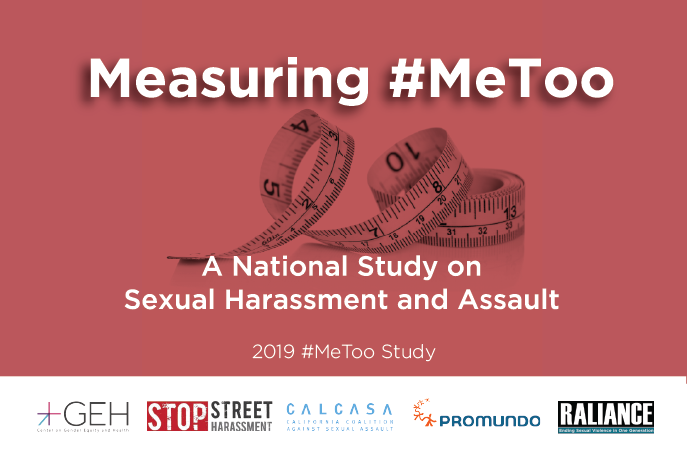We all deserve to feel safe in our communities, workplaces and homes. But change doesn’t happen on its own, though. That’s why RALIANCE teamed up again with partners at UC San Diego Center on Gender Equity and Health, Stop Street Harassment, NORC at the University of Chicago, the California Coalition Against Sexual Assault (CALCASA), and Promundo to update the ground-breaking national study on sexual harassment and assault in the United States, putting data behind #MeToo stories to tell a clearer story about the prevalence of this issue and ways to solve it.
In addition to including a few questions from 2018 about people’s experiences facing sexual harassment and assault, we added several new ones this year regarding perpetration and accusations of sexual harassment and assault. We chose to add these questions in light of notable recent news, including Brett Kavanaugh’s Supreme Court nomination hearing and Education Secretary Betsy DeVos’ efforts to change Title IX guidelines.
Among the key 2019 findings:
- While verbal comments are the most frequently experienced form of sexual harassment, an alarming number of people also have faced more severe forms. Among all female respondents, 49% had been purposely sexually touched (or groped), 27% had been followed, and 30% had been flashed. On the most extreme end, 23% of women (1 in 4) had survived sexual assault, as had 9% of men (1 in 10).
- Women with disabilities and women who identify as lesbian or bisexual were more likely to report experiencing both sexual harassment and assault than women without disabilities and straight women, respectively. Among men, those in certain marginalized groups were also more likely to report experiencing sexual harassment and, especially, sexual assault; this includes men with disabilities, men living below the poverty line, and gay and bisexual men.
- Young people and marginalized groups have also experienced sexual harassment more recently. Of those who experienced sexual harassment or assault, 18% of women and 16% of men experienced it most recently within the past six months. At least one-third of young women aged 18-24 (32%), Black women (35%) and lesbian or bisexual women (39%) reported sexual harassment in the past six months, the highest prevalence across demographics.
The newly-released 2019 findings confirmed much of what we knew: Sexual harassment occurs across all parts of our life, particularly in public spaces. It affects everyone, with disproportionate impacts on marginalized groups. And they are acts of abuse of power, disrespect, and disregard for human dignity. What we find is that even in a self-reported survey, very few people have ever been accused of sexual harassment or assault, compared with those who have said they perpetrated it and especially compared with the many people who said they have experienced it. By and large, when people say they experienced sexual harassment or assault, they are telling the truth, but they still face significant barriers to coming forward with their stories.
NORC at the University of Chicago conducted the nationally representative survey of 1,182 women and 1,037 men across February – March 2019. UCSD’s GEH did the data analysis.
We are fighting for lasting cultural changes so that sexual harassment, misconduct and abuse don’t occur in the first place. Join us at www.raliance.org

